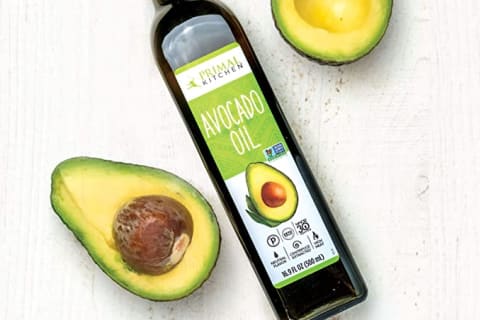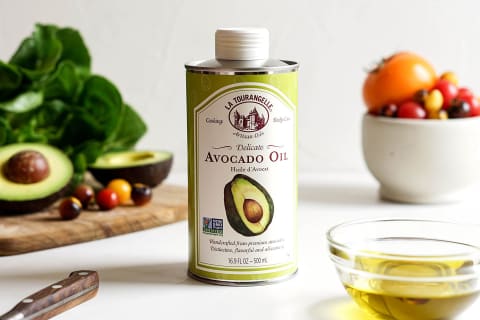Avocado oil has a high smoke point compared to other oils, says Nisha Chellam, MD, a functional medicine doctor with Parsley Health. The smoke point is 480 degrees Fahrenheit for unrefined avocado oil and 520 degrees for refined avocado oil. That’s significantly higher than extra-virgin olive oil (350 degrees) and vegetable oil (400 degrees). In one 12-week study3, 163 people who had up to 175 grams of avocado (about one large ‘cado) once a day found that those who ate the fruit had a more diverse range of gut bacteria compared to the control group. They also had lower amounts of bile acids in their feces, which can indicate that food is moving well through the stomach. Avocado oil falls under the category of liquid plant oil that is low in saturated fat, which is what the American Heart Association7 recommends cooking with for heart health. Avocado oil’s impact on cholesterol has been directly researched in several small studies. One crossover study8 in the Journal of Functional Foods had participants either eat a meal that featured 25 grams of butter or 25 grams of avocado oil. The participants had their blood drawn after each meal, and data showed that people who had avocado oil had lower levels of triglycerides, LDL (bad) cholesterol, and blood sugar compared with those who had butter. Chellam recommends applying avocado oil directly to your skin to reap these benefits. RELATED STORY: 4 DIY Avocado Face Mask Recipes For Dry, Dull Skin Dena Champion, an RD at The Ohio State University Wexner Medical Center, agrees. “Refined avocado oil is great for baking,” she adds. Keep in mind, though, that refining avocado oil strips it of phytochemicals, including chlorophyll and carotenoids. “This is not to say refined avocado oil is bad for one’s health,” says Champion. “It’s still a great source of healthy monounsaturated fats.” Depending on what you’re eating, though, you may prefer one over the other. “If you are baking cookies, you would not want the flavor of traditional avocado oil,” Champion points out. “Refined avocado oil also has a higher smoke point, which means you can heat it to very high temperatures before it burns.” “Avocado oil has a healthier nutrient profile than coconut oil,” Champion says. “Coconut oil is high in saturated fats, whereas avocado oil is high in unsaturated fats.” Coconut oil is also solid at room temperature which can make cooking with it slightly more challenging than avocado oil, Kris-Etherton says. “They’re both good for you, and it’s good to mix things up,” Kris-Etherton says. “A teaspoon of avocado oil has more than 100 calories4,” Chellam adds. “If you’re trying to lose weight, it’s important to be aware of that.” (Keep in mind, though, that the majority of plant-based oils like olive oil, grapeseed oil, and canola oil have similar calorie counts.) It’s also important to note that our macronutrient needs for fat should not be met with just oil. Champion says, “Dietary fat is important in a healthy diet, but plenty exists in whole foods such as nuts, seeds, and avocados.” Kris-Etherton recommends doing your research to buy from a company that practices responsible production and processing methods. It’s also a good idea to buy avocado oil that’s stored in a dark glass bottle, which blocks light and helps prevent the oil from oxidizing or going bad before its expiration date. Once the avocado is mushed and pulverized, the fat will float to the top, Kris-Etherton says. It’s similar to natural peanut butter, she explains—once you let it sit, the ingredients separate to reveal the oil. But just because it’s straightforward doesn’t mean it’s easy. It can be a very time-intensive process and can create a lot of food waste if you have no plans to use the rest of the fruit. “Think about a way of using the whole food,” Kris-Etherton advises.







